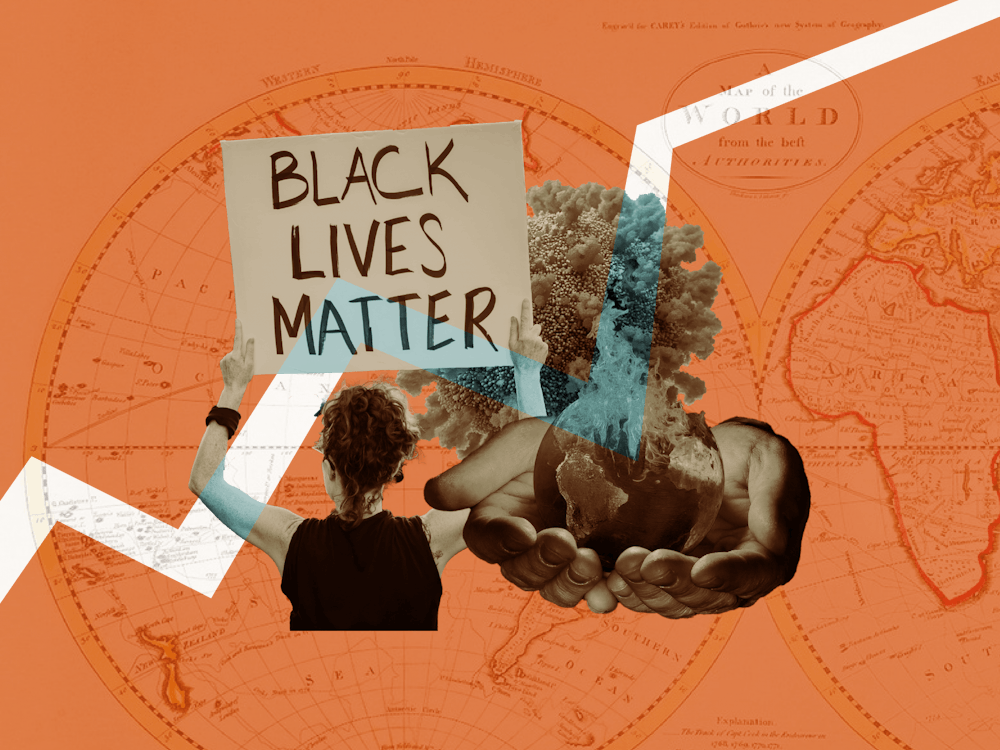Every day when I leave class, I step outside into the wintery Philadelphia weather, take off my mask, and take a deep breath of the crisp air, feeling refreshed. It is almost comedic how an act as trivial as taking off a mask can bring someone so much relief.
A year and a half of pandemic life, more than anything, has taught us to be grateful for the little things in life. Especially now, thanks to the help of vaccines and the hard work of so many health care workers, we are able to mimic our pre-pandemic life in post-pandemic ways: Going to concerts masks-off with our vaccination cards, attending athletics events socially-distanced, hugging each other without hesitation, seeing friends and families we have missed so much because COVID-19 restricted our ability to travel, and more.
However, the recent appearance of the Omicron variant has begun to loom over the world with a new shadow, keeping everyone on their toes. Mask mandates have been renewed, businesses have started to shut down, and even Penn has issued a strong guidance against social events sponsored by student groups. While the world is well-justified in lamenting yet another variant and taking all the steps to avoid another wave, to me, this is a reminder for us to not overly revel in the slightest joy of normalcy and be oblivious to the challenges that we still face.
Earlier this week, the Biden administration announced a diplomatic boycott of the 2022 Winter Olympics in Beijing: a salient reminder to myself, an international student from China, of the diplomatic tensions between the two countries and the intricacies of my identity. Wildfires, rising temperatures, and Hurricane Ida have made the crisis increasingly visible. The death of George Floyd and the trial of Kyle Rittenhouse reminded us of the systemic racial injustices that plague our society. There are many other issues that loom over our world, and there is simply no singular issue that defines our era thereof.
I’ll admit — all of this is very overwhelming. Especially after almost two years of pandemic life, we are exhausted by all of the grave challenges facing humanity. We may feel that it is simply easier to forget all the turmoils for one second and take pleasure in the little things. We may want to resort to unawareness as a remedy for mental and physical fatigue. After all, it can be taxing to think about the impending doom of climate change following a year and a half of quarantine.
While these feelings are well-justified, and I myself am guilty of wanting to pause all the chaos for one moment, we must not be overtaken by the sense of relief from post-pandemic life and start living in a bubble. It is dangerous to ignore the challenges that face us just because we are seemingly on the brink of leaving one behind. Many of these issues, such as climate change and systemic racial injustice, cannot wait, and require our active engagement. Moreover, thinking that our efforts are feeble and that someone else will fix the problem is part of the problem itself.
I do not wish to argue that we should all be thinking about how to resolve climate change, or any other challenges, on a global scale. Rather, I want to encourage the Penn community to take small steps to resolve the pieces of a larger issue. Now, more than ever, I am reminded of the motto of my own school, Wharton: “knowledge for action.” If you are passionate about COVID-relief, you can buy local and support small businesses. If you care about climate change, you can bring tote bags to ACME and use silverware to avoid single-use plastic. You can also initiate courageous conversations to help resolve racial discomfort. While these actions are certainly not enough, they are good places to start. Through focusing on the little steps, we can subdue the anxiety, fatigue, and overarching stress of resolving issues on the global scale.
The Chinese Confucian philosopher, Mencius, once evoked that when heaven is about to confer a great responsibility on any man, it will test their strength with challenges and hardships first. As we reflect on the challenges of 2021 and contemplate how we want to live in 2022, consider this not to be a nihilistic outlook, nor a stark warning, but a call to action: Do something in 2022 about an issue you care about. I recognize that all of this is easier said than done. I am still actively figuring out how to live freely yet consciously in a post-pandemic world. Nevertheless, I believe Hillel the Elder put it best: “If I am not for myself, who will be for me? And being only for myself, what am I? And if not now, when?”
SEE MORE FROM JESSE ZHANG:
I didn’t write off fraternities for myself, and you shouldn’t either
JESSE ZHANG is a College and Wharton sophomore studying marketing and communication from Shenzhen, China. His email is zhexi@wharton.upenn.edu.
Correction: A previous version of this article misattributed a quotation by Hillel the Elder to Malcom X. The DP regrets the error.









